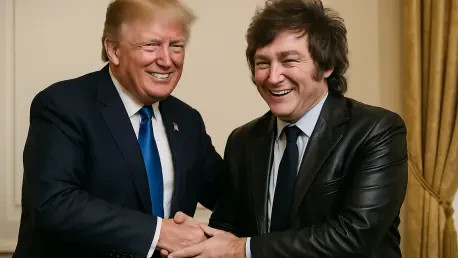In a significant development at the recent United Nations General Assembly in New York City, a pivotal meeting between U.S. President Donald Trump and Argentine President Javier Milei has sparked renewed hope for Argentina’s beleaguered economy, which has long grappled with financial instability as Latin America’s third-largest economy. Amid discussions on global challenges, this bilateral engagement stood out as a testament to strengthening ties between the two nations. Argentina finds itself at a crossroads, seeking international support to navigate its economic woes. The U.S. commitment, underscored by Trump’s assurance of assistance without a direct bailout, sets the stage for a nuanced partnership. This approach, coupled with accelerated investments from the World Bank, paints a picture of cautious optimism. Yet, the specifics of American aid remain vague, leaving room for speculation about how this pledge will translate into tangible outcomes for Argentina’s recovery.
Strengthening Bilateral Ties
A Meeting of Minds at the Global Stage
During the high-profile gathering at the United Nations, the interaction between Trump and Milei emerged as a focal point for observers of international relations. The two leaders, sharing a right-wing political alignment, displayed a rapport that extended beyond mere diplomacy. Trump’s public endorsement of Milei’s re-election bid highlighted a personal and political synergy, suggesting a deeper commitment to supporting Argentina’s current administration. This alignment is seen as a driving force behind the U.S. pledge to aid Argentina’s economic stabilization. While the meeting did not yield specific policy announcements, it signaled a willingness to explore creative solutions. Discussions around potential mechanisms, such as accessing the U.S. Exchange Stabilization Fund or establishing currency swap lines, were noted by Treasury Secretary Scott Bessent as possibilities under consideration. The absence of concrete plans, however, leaves the international community watching closely for the next steps in this evolving partnership.
Economic Implications of Political Rapport
The political camaraderie between Trump and Milei carries significant economic implications for Argentina, a nation desperate for stability amid persistent financial challenges. Market reactions following the meeting were telling, with Argentine international bonds rising and the peso strengthening by nearly 5% against the dollar. This surge reflects burgeoning confidence among investors that U.S. support, even if not in the form of a direct bailout, could provide a much-needed buffer. Trump’s explicit stance against a full financial rescue package indicates a strategy focused on empowerment rather than dependency. Instead, the emphasis appears to be on facilitating conditions for Argentina to stand on its own through strategic partnerships. While this approach may mitigate long-term risks of over-reliance on foreign aid, it also raises questions about the immediacy and scope of assistance. For now, the markets seem buoyed by the promise of collaboration, though sustained optimism will depend on actionable measures from the U.S. side.
International and Domestic Reactions
World Bank’s Accelerated Support Plan
Complementing the U.S. pledge, the World Bank has stepped forward with a robust plan to bolster Argentina’s economy through expedited investments. A commitment to disburse $4 billion from a larger $12 billion support package over the coming months targets critical sectors such as mining, energy, and tourism. Although specific projects remain undisclosed, this move by the development lender signals strong international faith in Argentina’s growth potential despite its ongoing struggles. The focus on both public-sector financing and private-sector initiatives suggests a comprehensive approach aimed at fostering sustainable development. This financial injection could serve as a catalyst for economic recovery, providing a more immediate framework than the yet-to-be-defined U.S. assistance. For Argentina, this dual support from major global players offers a lifeline, potentially easing some of the fiscal pressures that have long hindered progress. The World Bank’s actions underscore a broader trend of multilateral cooperation in addressing economic crises in the region.
Domestic U.S. Criticism and Policy Tensions
Back in the United States, the pledge to support Argentina has not been without controversy, revealing a divide in domestic policy perspectives. Senator Elizabeth Warren, a prominent Democratic voice, has raised concerns about the potential use of American taxpayer funds to stabilize a foreign currency or financial market. In a pointed letter to Treasury Secretary Bessent, she sought detailed explanations regarding the costs and justifications for such actions, especially at a time when many Americans face economic difficulties. This criticism highlights a persistent tension between international obligations and national priorities, a debate that often shapes U.S. foreign aid policies. The concern is not isolated, as other lawmakers and analysts question the implications of tapping into substantial resources like the $219.5 billion Exchange Stabilization Fund. This domestic pushback could influence the scope and speed of any U.S. assistance to Argentina, adding a layer of complexity to an already intricate international commitment.
Reflecting on a Nuanced Partnership
Looking back, the dialogue between Trump and Milei at the United Nations General Assembly marked a defining moment in U.S.-Argentina relations. The promise of support without a bailout, paired with the World Bank’s concrete financial commitments, created a wave of market optimism, even as specifics from the American side remained elusive. Domestic skepticism within the U.S., exemplified by Senator Warren’s concerns, underscored the challenges of balancing international aid with national interests. As reflections on this engagement continue, the focus shifts to actionable outcomes. Moving forward, stakeholders anticipate clarity on U.S. mechanisms like currency swaps or debt purchases, which could solidify this partnership. For Argentina, leveraging the World Bank’s investments in key sectors offers a practical starting point. The path ahead requires careful navigation to transform pledges into policies that stabilize and strengthen an economy in dire need, setting a precedent for how global alliances can address regional crises effectively.









